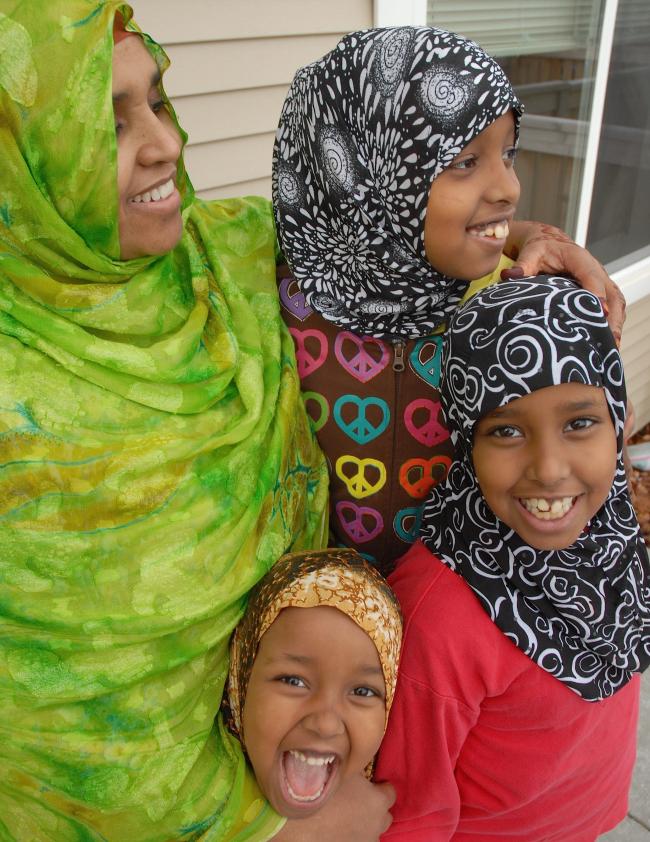Somali risked death for love
Clockwise, Fadumo Mohamed with her three daughters Ayan, 9, Amal, 7, and Abdi, 5, in their High Point backyard. Fadumo and her husband fled Somalia separately after her brothers threatened to kill them. The crime? She married beneath her clan. Now she and her attorney are trying to reunite her husband with her family here. He awaits our government's OK while in Abu Dhabi.
Fri, 11/27/2009
West Seattle High Point resident Fadumo Mohamed and her husband risked their lives to follow their hearts. Fadumo and Adam Jama Abdi grew up together in Merca, Somalia, 45 miles south of the capital, Mogadishu, where they had known each other much of their lives.
Both were Muslim, middle-class, and, when seen in public appeared a perfect match. However, when they married, they nearly signed their death warrant, and they knew it.
That’s because Fadumo is from the noble Nasab class of society while Adam is from the lower Nasab-Dhiman class. Somali’s refer to these tribal divisions as “clans.” For these two clans to intermarry is taboo.
“It’s very rare,” said Fadumo, here since 2007. “I loved this man. We wanted to make a new generation and change the culture. We were hoping to hide our whole lives.”
They moved south to a town near the Kenyan border and hoped for the best. Adam owned a food and clothes market and made a good living. Fadumo said that even the richest Nasab-Dhiman is still considered inferior to the poorest Nasab.
Fadumo speaks some English, but for this interview her neighbor and friend, Shuto Osman, a Somali woman who has been in America since 1995, helped translate.
“When two strangers meet in Somalia they typically say ‘Hello,’ then ‘How are you?” explained Fadumo. “In general, the third sentence would be, ‘Who are you and where are you from?’ That is how they know which clan the other belongs to. Adam and I lived in the same community, ate the same food, dressed the same way. There was no particular giveaway.”
But gossip spread and they were discovered.
“My family got very upset and said, ‘If you don’t stop with this one we’ll take action and kill you and your husband also,” recalled Fadumo. “This was considered a disgrace to the whole family, and our children were considered mixed. The people in my clan run for president and have high paying jobs. His clan is not allowed to work for the government, get good jobs, or marry us. My husband escaped.
"My mother did not approve of our marriage, but also did not want her daughter murdered by her sons. She hid me and was able to send me to a Syrian refugee camp. That was the easiest foreign country to enter.”
The couple lost track of each other. Each assumed the other was killed by Fadumo’s family. With three kids in tow, Fadumo immigrated to America. She arrived in Atlanta where she found a member of Adam’s clan who new many Nasab-Dhiman from back home including Adam’s cousin in Sea Tac. His cousin knew he was both alive and well in Abu Dhabl, his temporary home. She phoned Adam. He was shocked with delight, she said, and she moved to West Seattle to await his arrival.
But there was a wrinkle. Two years after they each fled, he thought he was a widower and remarried, and had another daughter. Once Fadumo contacted him he divorced his new wife and took custody of their daughter. Tragically, his second wife has since died, caught in gunfire in war-torn Mogadishu. However, the United States government rejected Adam’s request for immigration here as he was married, albeit unknowingly, to both women at the same time.
“He was denied (immigration) because he was considered a polygamist,” said their Seattle-based immigration attorney, Carol Edward, of Carol L. Edward and Associates. She believes that once the couple’s circumstances are brought to light Adam will then be able to reunite with Fadumo in High Point.
“We refile a new application and the chances are that we will be ultimately successful as a result of it,” said Edward from her Mount Vernon office. “This whole issue (of conflicts between clans) is big in Iraq, Afghanistan, and Pakistan,” she added. “There are two separate laws, tribal and government. People here don’t always realize we have lots of equality in America. That’s why people want to come here.”
Their three daughters, Ayan, 9, Amal, 7, and Abdi, 5 attend West Seattle Elementary. Fadumo studies English as a second language at South Seattle Community College and volunteers 20 hours a week at Youth Education Service at the new High Point Community Center just blocks from their home.
Both Fadumo and Shuto emphasized that clan discrimination and death threats like those Fadumo and Adam experience are not found in the Quran, and have no place in Islam.
“This is cultural, not religious,” said Shuto. She and Fadumo said they have observed a softening of endogamy and the inter-marriage taboo within the Somali community in Seattle. Those born here pay less attention to this cultural tradition, which they say is fine with them.


